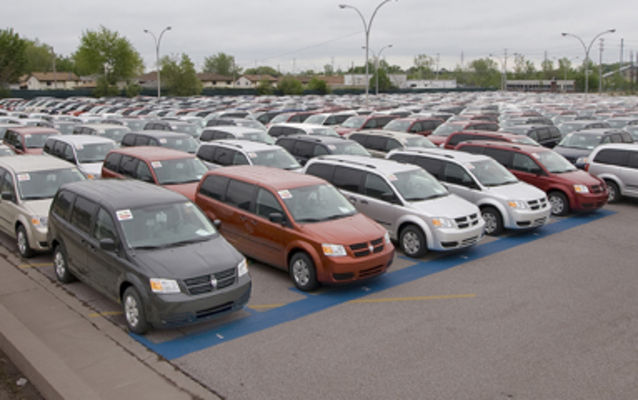Banks could end current `oligopoly' in auto leasing market.
A provision in the federal budget could allow banks to enter the auto leasing market, a move that advocates say would benefit consumers by ending the 'oligopoly' that currently exists. As credit markets tightened up amid the global financial crisis last year, it became increasingly difficult for consumers to lease new vehicles. If banks were allowed to enter the auto leasing market, it would not only make leases easier to get, but would probably lower leasing rates too, said Bruce Cran of the Consumers' Association of Canada.
``We're aware the car manufacturers have run themselves into such a dastardly financial situation that they're no longer easily providing leases, cheap or otherwise, in enough quantity to satisfy the market,'' Cran said. ``We say let the banks in.''
Auto industry analyst Dennis DesRosiers said more competition would be welcome in the auto leasing market, where the finance arms of the carmakers form an ``oligopoly'' that accounts for 94 per cent of leasing volume. ``And from a consumer's perspective, in most respects it's actually a monopoly because if you go into a Toyota dealer, the only lease you can get is a Toyota lease. There's no shopping around,'' DesRosiers said. The auto companies have long fought to prevent the banks from moving into the leasing market because it would allow consumers to bypass the car dealers, who currently provide leases through the automakers' financing arms. ``This would potentially turn every bank into a wholesaler of new vehicles,'' DesRosiers said.
``They'd be going out and cutting a deal and translating that to the consumer through the lease window, and that makes dealers redundant.'' Huw Williams of the Canadian Automobile Dealers Association said the banks have previously told his association they have no interest in entering the leasing market. He added that dealers are having a hard enough time securing financing from the banks as it is. ``
Quite frankly it's a little bit ridiculous to think while the banks are not doing their normal job of financing dealer operations, that all of a sudden they're going to ride to the rescue in the leasing market,'' Williams said. But DesRosiers said the automakers and their dealerships may well reverse their stance. General Motors' U.S. leasing arm, GMAC Financial Services, recently applied to become a bank holding company under U.S. law so it could benefit from bailout funds geared towards financial institutions. While banks can legally provide car leases in the United States, they can't in Canada, and the new bank status of the financing arms would force their Canadian subsidiaries to stop providing leases.
``The ironic thing is, in order for them to get more funding, they have to agree not to lease,'' DesRosiers said. ``
So all of a sudden you see them turning on a dime. They had the most rigorous lobby on any issue in the last 15 years in the auto industry to keep banks out of leasing. Now you have the exact opposite: they have turned into an incredible, rigorous lobby to allow banks to lease.'' But he added there's so much risk inherent in car leasing that the banks may not be interested in entering the market, even if given the chance. Because the value of a car lease is dependent on how much that car will fetch in the used-vehicle market when the lease expires, it's very difficult to make money off a lease.
``The used car market is a culture of deceit,'' DesRosiers said. ``Everybody's trying to rip everybody else off and how does a bank deal with that and control it?''
``Historically, every single bank that's dabbled in leasing has ended up losing money.''
But Cran said banks should at least be given the chance to enter the market.
``They should have the chance. If they do it, fine. If they don't, they should forever hold their peace,'' he said.
The Canadian Bankers Association said there is no industry-wide position on the issue yet. ``That being said, the CBA is generally opposed to any restrictions that prevent competition and choice for consumers in the marketplace,'' the CBA said in an emailed statement. Bank of Nova Scotia (TSX:BNS) and Royal Bank of Canada (TSX:RY) both said they're evaluating their options but it was too soon to tell whether they would ultimately decide to move into the auto leasing market. Canadian banks have been banned under the Bank Act from holding title to depreciating assets, which include car leases, since the 1980s, said Cran. But this week's federal budget included a provision to reopen the debate about amending the Bank Act to potentially allow banks to lease cars.
The high cost of borrowing has forced the industry to cut costs. Chrysler Financial Canada said in November it would lay off about 150 employees, and Ford Motor Credit said Thursday it will cut 1,200 U.S. jobs. The lack of financing for consumers has created a vicious cycle for the North American automakers, which are struggling to stay afloat amid an unprecedented drop in sales. Their financing arms have been forced to increase the credit score necessary to get a lease to protect themselves from defaults, but this in turn means consumers are less likely to lease new vehicles.
There was some hope in the federal budget when the government announced it will create a Canada Secured Credit Facility to buy up to $12 billion in securities backed in part by vehicle leases, which could help free up the leasing market.







